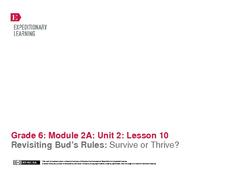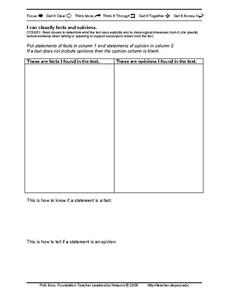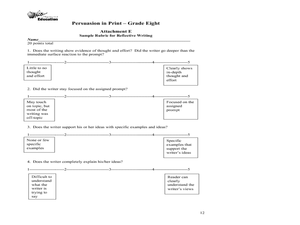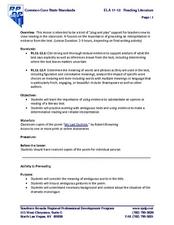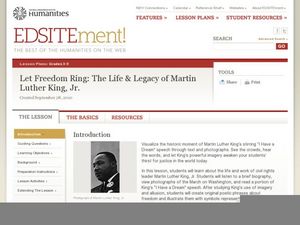K12 Reader
What Do You See? (Inferences)
Making inferences is a skill that goes beyond the comprehension of written text. In this simple exercise, young learners are provided with a photograph and asked to answer a series of inference questions using only on the information...
Scholastic
Drones Take Off
Ever wonder what drones are doing high above us in the sky? This article gives your class an insight to what those robots in the sky are doing. After reading an article on drone technology, pupils are prompted to respond to a variety of...
EngageNY
Revisiting Bud’s Rules: Survive or Thrive?
Bud followed a series of rules from Bud, Not Buddy by Christopher Paul Curtis. The question is, how did he use those rules to thrive or survive? After a grand discussion, class members explore the novel to locate and cite textual...
iCivics
Lesson 3: Bias
How do journalists balance bias and ethical reporting? The final lesson in a series of five from iCivics examines the different types of bias and how they affect the news we read. Young reporters take to the Internet to find examples of...
College Board
2007 AP® English Language and Composition Free-Response Questions Form B
Do museums offer eyes into the past? Scholars synthesize sources to make a claim in an essay about the importance each museum artifact deserves. Pupils also write to analyze journalist level of ethics as well as a speech by Wendell...
K20 LEARN
No Imitations, Please! Avoiding Plagiarism
With all the stuff available online, good essays are just a click away. But talk about tracking! Writers beware! New tech can now identify plagiarism, and the consequences of presenting someone else's work as your own are severe. Here's...
Curated OER
Express Yourself Lesson Seed 9: Climax
Conduct a close reading of chapter 9 of The Cay. Read the chapter again and ask pupils to respond to a list of included text-dependent questions. Finish the class with the provided writing assignment, which asks learners to use textual...
Polk Bros Foundation
I Can Classify Facts and Opinions
Telling fact from opinion can be tricky. Direct your class to practice their reading and comprehension skills by taking notes on the facts and opinions in a text. Pupils fill out a two-column chart and write down how they know a...
DePaul University
Settlement
Early settlers in the American Midwest experienced constant struggle. This reading passage describes for young learners the hardships of homesteaders as they journeyed west and sought to start a new life. When finished, students identify...
Curated OER
Persuasion in Print
Advertisers target teenagers. Groups select three magazine advertisements for similar products, analyze the appeals used in each, create a poster that features the persuasive techniques used, and present their findings to the class. The...
Polk Bros Foundation
I Can Compare and Contrast
Work with your class to fill out this Venn diagram. Pupils can compare and contrast any two things and then write a short paragraph about the relationship demonstrated in their diagram.
Polk Bros Foundation
I Can Identify/Infer Motive
Why do people and characters act as they do? Require your class figure out the motivation of two people or characters they read about in a given text. In the short charts, pupils note down who, what they do, and why they do it. After...
Polk Bros Foundation
I Can Sequence Important Events
After reading any short informational or fictional text, ask your class to analyze the important events. They note down three important events on a short timeline, describing the events with either words or drawings. After this, pupils...
Pennsylvania Department of Education
Using Literary Elements to Compare Fiction Texts
Students explore language arts by reading and reflecting on literary examples. In this fiction writing lesson plan, students read several different cultural versions of the story "Cinderella" and discuss their interaction with the story...
K5 Learning
What Police and Detectives Do
What do police and detectives do to keep their community safe? Six short-answer questions make up a worksheet designed to reinforce reading comprehensions skills while providing information about police officers and detectives.
Curated OER
Solve a Mystery
Fourth graders use text clues to solve mysteries. For this text clue/mystery solving lesson, 4th graders access a teacher assigned web site, Cyberkids.com, where they solve a mystery. They read chapters of, Encyclopedia Brown, and work...
Curated OER
Cause And Effect
Fourth graders read the book Stellaluna and cite sentences that show cause and effect in the story. In this cause and effect lesson plan, 4th graders also write sentences that show cause and effect in their own lives.
Curated OER
Where the Red Fern Grows Chapter 16-17
Find out how much your class understood of the listed chapters of Wilson Rawls' novel. Class members respond to eight plot and character questions before looking closely at an instance of personification from the text. The resource is...
Curated OER
Where the Red Fern Grows Chapter 4-6 Worksheet
Looking for a quick review sheet for several chapters of Wilson Rawls' novel Where the Red Fern Grows? Check out this one, which is made up of a straightforward list of questions that ask learners to remember the plot and express their...
Novelinks
Touching Spirit Bear: Anticipatory Guide
Will Peter and Cole ever forgive one another? Anticipation guides contain questions such as this to help teach readers how to make predictions about a text. First out of a series of five resources, the guide is full of statements about...
Curated OER
Plagiarism Workshop
What do George Harrison, Vanilla Ice, and Steven Ambrose all have in common? The Warner Brothers’ films Batman Forever and The Devil’s Advocate? All are guilty of plagiarism. And if you are considering a research project and want to...
Dr. Seuss Enterprises
Dr. Seuss in the Classroom
Explore the works of Dr. Seuss, such as Horton Hears a Who, Horton Hatches and Egg, The Sneetches and Other Stories, The Lorax, The Butter Battle Book, and Yertle the Turtle and Other Stories. Each story lesson includes reading...
Southern Nevada Regional Professional Development Program
Reading Literature - My Last Dutchess
Draw back the curtain, add a spot of joy to your class, and let learners be instructional activityed by a close reading exercise that models how to develop an interpretation based on evidence drawn from a text. Robert Browning’s dramatic...
Curated OER
Let Freedom Ring: The Life & Legacy of Martin Luther King, Jr.
Students use text and photos to visualize the delivery of Dr. Martin Luther King, Jr.'s historic "I Have A Dream" speech. They analyze Dr. King's speech for examples of imagery and allusion and create original poetry and illustrations...




